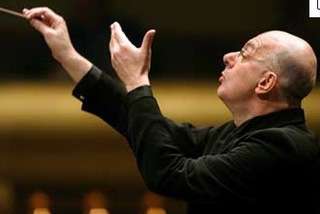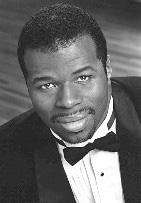|
Back
Cakes and Apocalypses New York
Isaac Stern Auditorium, Carnegie Hall
02/10/2013 -
“Truth or Truffles”
Karl Amadeus Hartmann: Sodom and Gomorrah
Richard Strauss: Schlagobers, opus 70
Lester Lynch (Baritone)
American Symphony Orchestra, Leon Botstein (Conductor)

L. Botstein (© Steven J. Sherman)
Leon Botstein titled this afternoon’s concert “Truth or Truffles”, though the harrowing opening work is more tragic than truth, and the second work, with its animated bakery items, never mentions truffles–either root or chocolate.
Perhaps a more apt title might have been “Catastrophes and Candies”. Or, keeping the food imagery, in Leon Botstein’s case “Meaty Music, Rare and Well Done”.
The only similarity between the monodrama by Karl Amadeus Hartmann and the ballet score by Richard Strauss was that the two composers were so dissimilar in facing the world. Hartmann, like Strauss, stayed in Germany during the Third Reich, but showed his scorn in many ways. Strauss, married to a half-Jewish woman, weaved and bobbed about his allegiances, but his conscience presumably never bothered him.
Hartmann came out of the War politically unscathed, and his last work was so harrowing, so brilliant and such an intense work that one feels all his frustration came out of him. Yesterday afternoon, his Gesangsszene (“song-scene”) Sodom and Gomorrah was not the Biblical tale, but an excerpt from a play by Jean Giraudoux. In the original French and Hartmann’s German edition, it could be a variation on Ozymandias, Shelley’s quatrain about the inevitable death of empires.
Giraudoux expanded that to an almost apocalyptic epic sphere, depicting “Symphonies from the air...alliances to keep people from war...the pleasures of life and world conquest”...all taken away by “an evil...the disease of great empires.”
The piece here is half for orchestra, half for baritone. It begins with a mere flute solo (which appears later), progressing to a battering orchestral skein, to more dissonance, more orchestral interludes that seem to hammer against the listener.
And bless the American Symphony Orchestra, for too often they have been accused of not quite right playing. Here, the clashing brass, the orchestral dissensions, the sharp, rocketing music was spot on, piercing directly into the auditorium.

L. Lynch (© Mirshak Artists)
Into this tumult came that fine operatic baritone Lester Lynch, creating chants, songs, declarations with and against the orchestra, the battlegrounds of imperial success and the fierce pain of empires dying.
In a way, Sodom and Gomorrah is akin to Arnold Schoenberg’s Survivor From Warsaw, a narrator so intent on his goal or intense on his message that we, the mere audience are bleeding for him. I cannot criticize Mr. Lynch’s German, not being an expert, but his emotional grasp, his inner strength needed no special volume to make his import clear.
And like Survivor from Warsaw, where the narrator leaves the orchestra to recite the Jewish Sh’ma prayer, so at the end here, Mr. Lynch stepped forward and spoke the horrifying last words “It is the end of the world. The saddest thing of all.”
I do have a serious criticism that, since these words are so graphic, so poetic, so vehement, they should have been sung in English. So powerful is this piece that both music and words should be immediately understood.
On the other hand, I sincerely wish that the English movements of Richard Strauss’s “Whipped Cream” (Schlagobers) had stayed in the original German. I have nothing against characters called “Princess Praline”, “Prince Cocoa” or Mlle. Chartreuse” (well, actually I do), and sections called “Dance of the Tea Leaves”, “Appearance and Dance of the Sugar” and “Dance of the Little Pralines” and “Dance of the Serenity Beer” are (I suppose) tolerable.
After all, Tchaikovsky (upon whose Nutcracker this ballet was modeled), did have “Dance of the Sugar Plum Fairy.” But Tchaikovsky’s score was delicate, ingenious, sensitive. The Russian was always aware that Nutcracker was not only about children but for children. Richard Strauss, with his bloated orchestra, Viennese waltzes (not a one of which could compete with Rosenkavalier) and monstrous dances for cocoa, tea and sugar, was ingenious. But hardly delicate.
For his earlier tone poems, Strauss had boasted that he could musically differentiate between a soup spoon and a tea spoon. In Whipped Cream, the character of “Sugar” is hardly ingenious. It’s a saccharine violin solo and harp. “Cocoa” had some snapping percussion (ah, yes, exotic Africa), and the dance of “Beer”–here, German beer the savior against decadent French, Slavic and Russian brews–was given a chorale more suitable for Bruckner.
Not that I didn’t enjoy it 90-minute score to a degree. My first recording was of Richard Strauss, and I have a soft spot (in this case, a candy spot) even for his minor works. In fact, the last connected dozen-odd dances did have an energy and that old Straussian spirit, which Mr. Botstein obviously enjoyed.
Nothing was political here, and Strauss writing such froth during the German Depression was no worse than Hollywood producing Busby Berkeley extravagant musicals during the 1930’s. Yes despite Strauss’s reversion to old dances, this was not a very balletic score at all.
One must applaud Mr. Botstein for digging up a ballet about food. One wonders, though, whether, with his splendid detective work, the conductor may uncover some day Richard Wagner’s homage to Jewish bagels. I believe the original title was The Ring of the Nibbling.
Harry Rolnick
|